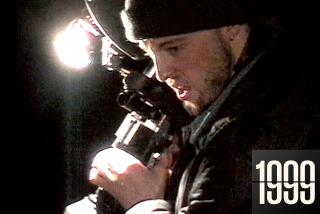Cyberspace Taking the ‘Sneak’ Out of Sneak Previews
- Share via
Until relatively recently, most of what the public knew about a new movie before it was released came directly or indirectly from studio advertising and marketing departments. The studios went to great lengths to keep it that way.
Today, even before a movie is cast--even before a deal is made--Internet sites circulate copies of hot scripts that studio executives are taking home to read that weekend. Then, as negotiations and production unfold, these sites--https://aint-it-cool-news.com foremost among them--routinely post news of casting decisions, trouble on the set and budget overruns. As with much else on the Internet, this information isn’t routinely subjected to the kind of editing that traditional print publications require, so the potential for error is great--as occurred last October when Aint-It- Cool-News named the wrong young actor as starring in the movie version of “Harry Potter.” Aint-It-Cool-News has had its share of scoops, but it also erred last Oscar season when it posted a list of purported finalists for Academy Awards nominations on the eve of the nominations announcement, only to learn later that it had been the victim of a hoax.
Much more troubling to the studios, Aint-It-Cool-News and other Web sites post their users’ appraisals of movies they see at test screenings--the screenings that studios have long used to gauge audience response and to determine what, if any, changes should be made to the movie before it is released.
“You’re taking something out that’s a work in progress, but then there’s this report online that says it’s awful and here’s why, and then maybe the other media pick it up and your movie is in trouble with the public, even before it’s ready for the public,” says Bruce Berman, former president of worldwide theatrical production for Warner Bros. and now chairman and chief executive of Village Road Show Pictures Entertainment.
“It’s like reviewing a book or a newspaper story before the final editing is done,” Berman says, “and it discourages risk-taking and innovation.”
Journalists counter that newspaper and book publishers make their own decisions about the final form their products will take; they don’t test them on prospective readers beforehand. As long as movie makers feel compelled to test their movies with audiences, rather than relying solely on their own judgment, reporters say they have to accept the consequences.
But moviegoing, unlike reading a book or newspaper, is not generally a solitary experience, and studios say that reactions can best be judged by showing a movie in a group setting, preferably a group not involved in the movie-making process. When one member of that test group immediately posts a report, though, the consequences can be devastating.
Warner Bros., for example, blamed Aint-It-Cool-News for the bad buzz that preceded the release of “Batman and Robin” and contributed to the film’s box office flop in 1997. Columbia Pictures says a Los Angeles Times story on a reported test screening that they insisted never took place helped kill Arnold Schwarzenegger’s “Last Action Hero” in 1993. Other studios cite similar examples.
Journalists insist that it’s bad movie making, not bad buzz, that kills certain movies. But no one knows for sure why a given movie succeeds and another fails, and in an effort to improve their odds of success, many studios now openly court Harry Knowles, the 29-year-old self-described “film advocate” who runs Aint-It-Cool-News from a three-bedroom house in Austin, Texas.
They’ve flown him to filming locations for exclusive looks at their films, invited him to premieres when the movies open, given him private advance screenings and, on occasion, provided him with a personal print of a newly released movie.
Knowles insists he hasn’t been “co-opted” by these perks and he says his success has recently enabled him to begin paying his own way to premieres and filming locations. But many in Hollywood think his objectivity has been compromised.
Knowles is just one player on the Internet, though, and it’s clear that studios recognize the importance of this new medium, all the more so since its predominant role in the marketing of the original “Blair Witch Project,” which went on to enjoy runaway success at the box office in 1998.
Because postings on most Web sites are anonymous, studios can flood them with praise for their current releases, giving the false impression that test audiences love these movies.
“Studios manipulate https://aint-it-cool-news.com and other Web sites,” says Rick Lyman, who covers Hollywood for the New York Times. “There aren’t as many people on the planet Earth who liked ‘Battlefield Earth’ as wrote raves on those Web sites before it was released.”
(BEGIN TEXT OF INFOBOX / INFOGRAPHIC)
Movie Web Sites
The Internet has intensified the already vigorous competition for Hollywood news, views, rumors and gossip. This is a small sampling of Web sites with information on the world of movies.
www.aint-it-cool-news.com www.hollywoodreporter.com www.ifilm.com
www.inside.com www.mrshowbiz.com www.showbizdata.com www.variety.com
www.imdb.com
www.intomovie.com
www.littlegoldenguy.com
movies.thevines.com
More to Read
The biggest entertainment stories
Get our big stories about Hollywood, film, television, music, arts, culture and more right in your inbox as soon as they publish.
You may occasionally receive promotional content from the Los Angeles Times.










